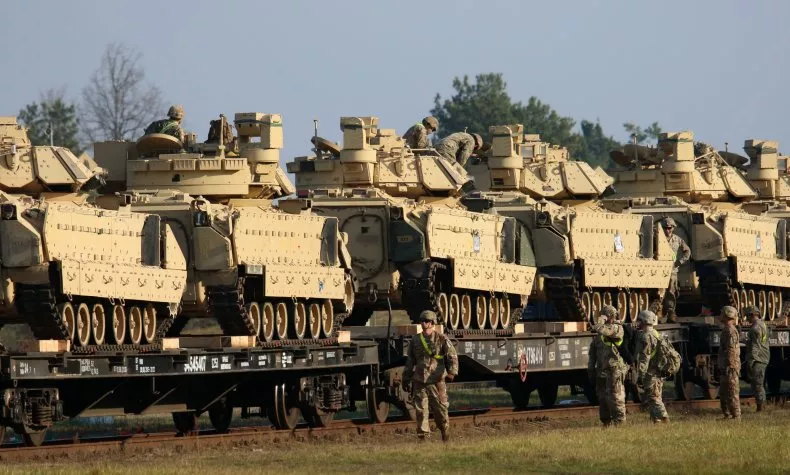Soldiers of the People’s Liberation Army (PLA) march in Beijing, China, 2019. Photograph: Thomas Peter/Reuters
A decade on from psychologist Steven Pinker’s declaration that violence is declining, historians show no sign of agreeing a truce
By Laura Spinney
The Guardian
Nov 7, 2021 - Ten years ago, the psychologist Steven Pinker published The Better Angels of Our Nature, in which he argued that violence in almost all its forms – including war – was declining. The book was ecstatically received in many quarters, but then came the backlash, which shows no signs of abating. In September, 17 historians published a riposte to Pinker, suitably entitled The Darker Angels of Our Nature, in which they attacked his “fake history” to “debunk the myth of nonviolent modernity”. Some may see this as a storm in an intellectual teacup, but the central question – can we learn anything about the future of warfare from the ancient past? – remains an important one.
Pinker thought we could and he supported his claim of a long decline with data stretching thousands of years back into prehistory. But among his critics are those who say that warfare between modern nation states, which are only a few hundred years old, has nothing in common with conflict before that time, and therefore it’s too soon to say if the supposed “long peace” we’ve been enjoying since the end of the second world war is a blip or a sustained trend.
In 2018, for example, computer scientist Aaron Clauset of the University of Colorado Boulder crunched data on wars fought between 1823 and 2003 and concluded that we’d have to wait at least another century to find out. Clauset doesn’t think it would help to add older data into the mix; indeed, he thinks it would muddy the picture.
“It’s up to researchers who study substate-level violence to substantiate their claims that the dynamics of such violence are relevant to the dynamics of war and, in my view, they haven’t done a great job there,” he says.
Most researchers accept that there is a difference between war and interpersonal violence – and that these two things are governed by different forces – but there is disagreement over where to draw the line between them. Historian and archaeologist Ian Morris of Stanford University, author of War! What Is it Good For? (2014), is among those who say that the nature of collective violence hasn’t changed much in millennia, it’s just that human groups were smaller in the past. For him, therefore, a massacre of a couple of dozen of hunter-gatherers in Sudan around about 13,000 years ago, the earliest known example of collective violence, is relevant to a discussion of modern warfare.
Archaeologist Detlef Gronenborn of the RömischGermanisches Zentralmuseum in Mainz, Germany, agrees. In 2015, he and others described a massacre among Europe’s earliest farmers at a place called SchöneckKilianstädten in Germany, about 7,000 years ago. More than two dozen individuals were killed by blunt force instruments or arrows and dumped in a mass grave, their lower legs having been systematically broken either just before or just after death. The absence of young women from the group suggested that the attackers may have kidnapped them. Gronenborn says that massacres of entire communities were frequent occurrences in Europe at that time and that one of their hallmarks, judging by the human remains, was the desire to erase the victims’ identity. “The only difference between then and now is that of scale,” he says.
But while some researchers may agree with Pinker that prehistoric and modern warfare are essentially the same phenomenon, they don’t necessarily agree with him that the evidence points to a longterm decline. Pinker based his claim that prehistory was extremely violent on around 20 archaeological sites spanning 14,000 years. Those sites unequivocally attest to ancient violence, says historian Dag Lindström of Uppsala University in Sweden, “but they cannot be used for quantitative comparative conclusions”. We simply have no way of knowing how representative they were.
Collective violence has been one way in which societies have reorganized themselves to become more humane and prosperous
“The further you go back in time, the more difficult it becomes to have an accurate assessment of how many people died in battle,” says historian Philip Dwyer of the University of Newcastle in Australia, who coedited The Darker Angels of Our Nature. Civilian death counts are even less reliable, he says, and have likely been significantly underestimated throughout history. In Dwyer’s view, all war-related statistics are suspect, undermining attempts to identify long-term trends.
Others think the statistics can be informative. Gronenborn’s work is feeding into larger-scale efforts to identify and explain patterns in collective violence. One such effort is the Historical Peace Index (HPI), a collaboration between Oxford University and the group behind Seshat: Global History Databank – a scientific research project of the nonprofit Evolution Institute – to map warfare globally over the past 5,000 years. Their goal, as the name suggests, is to try to understand the causes and consequences of war, with a view to building more peaceful and stable societies.
The argument of those taking this kind of approach is that the more data you gather, the more you can identify meaningful patterns. Gronenborn, for example, says that it is beginning to look as if collective violence was cyclical in neolithic Europe. One hypothesis he and others are testing is that mounting internal social tensions fuelled explosions of violence, with external shocks such as climate fluctuations acting as triggers.
The awkward truth is that collective violence has been one way in which societies have reorganised themselves to become more humane and prosperous. But as societies changed, so did the reasons they went to war.
“People always want to know: what was the earliest war?” says bioarchaeologist Linda Fibiger of Edinburgh University. “But it would be more interesting to ask: how did neolithic people define violence? What was their concept of war?”
Any debate over the decline – or not – of war must take into account its changing nature, Dwyer says, adding that it didn’t stop changing 200 years ago. In the decades since the second world war, for example, major international conflicts have become less frequent, but small wars have proliferated. This has happened, argues Yale University historian Samuel Moyn in his new book, Humane, in part because over the 20th century the justification for war shifted to peacekeeping and the defence of human rights, ensuring that war shrank in scale but became “for ever”.
The trouble with small-scale wars, as Clauset and others have found, is that they have a strong tendency to escalate, especially if they go on for a long time. In 2019, political scientist Bear Braumoeller of Ohio State University published Only the Dead, in which he argued that the risk of escalation today was as high as it had been when European leaders sent their troops to war in the summer of 1914, believing they would be home by Christmas.
“When it comes to the propensity of war to spiral out of control and produce mindboggling death tolls, we live in the same world that they lived in,” he wrote.
Why war escalates so easily is not well understood, but Braumoeller says it’s a “good bet” that technology is a factor. Scientist Peter Turchin of the Complexity Science Hub in Vienna, one of Seshat’s cofounders, agrees. He says that stepwise advances in military technology – he calls them “military revolutions” – may have been major drivers of collective violence.
The military revolution, singular, is the term historians use to describe the period of rapid technological and social change that began in the 16th century with the advent of portable firearms. But Turchin says there were others. One of the most important got under way about 3,000 years ago, across a swath of Eurasia south of the steppes, when archers armed with irontipped arrows first mounted horses.
Each time, the technology handed an advantage to those who had it, stimulating a technological and eventually social arms race. And that technology wasn’t even necessarily devised for military ends. The farming revolution, which ushered in the neolithic period, was also a military revolution, because the advances that gave farmers new tools also gave them new weapons. And some have argued that war became more lethal in the early 1800s in part because of the newfound ease of moving troops and supplies by rail.
“The upshot was that, with more soldiers on a given battlefield, it took more deaths on both sides to win a battle and therefore more deaths to win a war,” Braumoeller says.
Many people perceive technological change to be accelerating. The 20th century saw at least one military revolution, as a result of which we have nuclear weapons and the capacity to wage war in space. The early nuclear weapons were so destructive and so bad at hitting targets that they acted as effective deterrents and helped usher in this current period of stability, Morris says, but counterintuitively, we may have more grounds to worry now that they are generally smaller and more precise.
Morris sees parallels between the period we’re living through now and the late 19th century when international conflicts were few, but small-scale insurgencies and civil wars proliferated, and some of them, such as the Boer war, spiraled out of control. That long peace was finally shattered in 1914 and this one will be eventually too, he thinks.
What the cause and who the belligerent parties will be in the war that breaks the peace is not yet possible to say of course, though there has been much speculation – for example that it may involve Chinese military action against Taiwan. Nevertheless, for those who believe that the past can be instructive about the present, just not in the way Pinker does, Better Angels recalls a slew of books published on the eve of the first world war that proclaimed that war between the great powers was a thing of the past.








